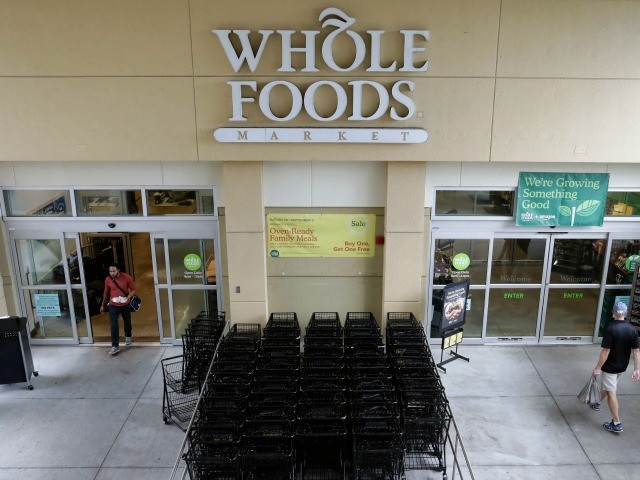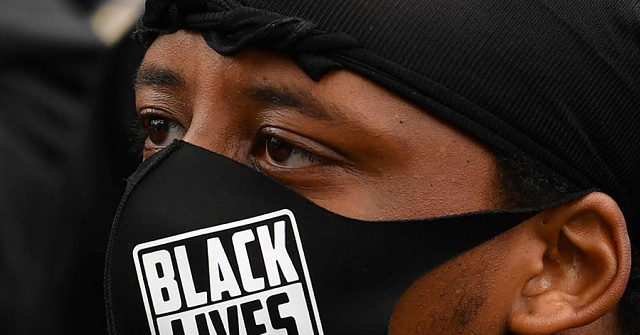The upscale grocery chain Whole Foods claims the National Labor Relations Board’s (NLRB) order to allow its employees to wear “Black Lives Matter” masks violates its constitutional rights.
In October 2020, the Amazon-owned Whole Foods stoked controversy when it announced a new dress code policy that banned its employees from wearing “busy patterns on clothing or face coverings, buttons or pins on employee aprons, ripped jeans, athleisure, and t-shirts with visible logos, slogans, messages, or flags of any kind,” according to Insider.
“When a lot of us started working at Whole Foods back in the day, it was a place where you could wholly be yourself and express your personality while still working your job,” one employee said at the time. “We’re worried that it’s leaning toward a more super-corporate, you’re-just-another-cog-in-the-machine kind of employee situation.”

Customers shop at a Whole Foods Market, Monday, Aug. 28, 2017, in Tampa, FL. (AP Photo/Chris O’Meara)
Earlier that year, several employees sued Whole Foods for allegedly threatening them with termination for wearing BLM masks while at work. Though a federal judge dismissed the case in February 2021, the prosecutors for the NLRB have claimed that Whole Foods “violated federal labor law by banning employees from wearing ‘Black Lives Matter’ insignia and punishing staff around the country who did,” according to Bloomberg. In mid-December of last year, Whole Foods fired back at the NLRB, claiming that its first amendment rights were being violated, citing Section 7 of the National Labor Relations Act (NLRA). Per Bloomberg:
The company’s filing, obtained via a Freedom of Information Act request, accuses the labor board’s general counsel, Jennifer Abruzzo, of trying to unconstitutionally “compel” speech by Whole Foods in violation of its First Amendment rights. The upscale grocer also accuses her of “unlawfully infringing upon and/or diluting WFM’s protected trademarks” by trying to mandate that it allow the display of a “political message in conjunction with” its trademarked uniforms and logos.
Whole Foods contends that Section 7 of the NLRA, which protects employees’ right to take collective action related to working conditions, doesn’t extend to workers’ BLM messages, which it calls “political and/or social justice speech.” The company’s filing argues that “BLM” and related phrases “are not objectively understood to relate to workplace issues or improving working conditions at WFM’s retail grocery stores” or employment terms and conditions in general. “Employees do not have a protected right under Section 7 of the Act to display the phrase ‘Black Lives Matter’ or ‘BLM’ in the workplace,” the company’s attorneys wrote.
President Biden-appointed Jennifer Abruzzo maintains that workers have a right to pursue “racial justice advocacy” and that it falls in line with the NLRA’s allotment for “group action to improve their lot as employees.”
“The employer certainly can control whether people of color get harassed and discriminated against at their workplace,” she said last month. “We’re about a broader movement. But that broader movement flows into our smaller workplace universe.”
A Whole Foods spokesperson defended the company’s dress code policy, asserting it ensures that employees and customers are given “a shopping experience focused entirely on excellent service and high-quality food.”
“We do not believe we should compromise that experience by introducing any messages on uniforms, regardless of the content, that shift the focus away from our mission,” the company stated.
